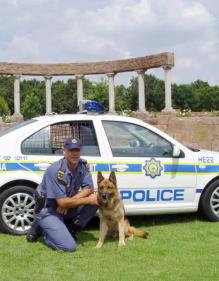|
Getting your Trinity Audio player ready...
|
 By Zaheer Cassim
By Zaheer Cassim
It’s Friday evening, close to midnight. Aislinn Laing is in the car with her husband and her mother-in-law. Laing and her family are from England and are driving in a rental vehicle through Parkview, one of Johannesburg’s more affluent areas. It’s late and all they want to do is get home.
Laing can see blue lights in the rear view mirror. Her husband stops the car. Two policemen get out of the vehicle but Laing can’t make out what car or which station it’s from. The officers are wearing the blue uniform associated with the South African Police Service (SAPS), but their names aren’t visible on their uniform.
FACT: Police officers are required to have their names displayed on their uniforms. If this is not present, you may request the officer for his or her name.
FACT: SAPS has the right to pull over a car on the road and to search it. However, if you feel endangered, you are within your rights to ask the police officer to accompany you to the nearest police station to do the search.
The officer identifies himself as part of the Rosebank police force. He then starts to accuse the driver of being drunk – which the driver denies. The officer then asks him to step out of the car.
FACT: All official police vehicles have a code printed on the side. The letters represent the name of the station and the digits represent the squad car number. If you are being harassed, it is advisable to try to remember this code.
FACT: A police officer has the right to ask you to step out of your vehicle and search you. However, women may request a female police officer to search them and if one is not present, the police have to call in another squad car to do the check.
The driver refuses and tells the officer he is not drunk. The police officer starts threatening to take the driver to Hillbrow Clinic for a blood test to measure his alcohol level.
FACT: Before a police officer can take you to a clinic for a blood test, he first has to take you to the nearest police station to open a docket reporting the facts of the case.
The couple deny that they have been drinking. Laing tells the officer that she is a journalist and that she knows her rights. He responds: “In this country, women are here to respect men.”
FACT: A police officer may not verbally abuse or intimidate another person and incidents like these can be reported at any police station in the country.
The couple plead with the police to let them go as they have done nothing wrong. The officer then says: “Get out of the car and beg.”
FACT: No policeman can talk to a person in this way. If you are in a similar situation, remain calm and ask for the officer’s name. If you do not feel comfortable asking this, try to look for physical clues that can identify the officer at a later stage, or try to get a license plate number or the code written on the side of the police vehicle.
Minutes later, the family is allowed to go. Laing reported the incident to Corruption Watch via its Twitter page. Corruption Watch took the matter to the Rosebank police station and found out that on that evening, there were only two squad cars patrolling the area between midnight and 01h00.
Based on this information, and on the fact that the harassed family couldn’t conclusively say that they had noticed badges or car codes, either the men in the car were illegally impersonating the police, or it was in fact one of the two squad cars that stopped them. The onus is now on the family to step forward and identify or exonerate the police officers implicated.
FACT: By recording the time and location, the public service representative at the corresponding police station can check which officer was covering a specific area at any given time of the day.
Know your rights and don’t be afraid to report incidents of intimidation.



